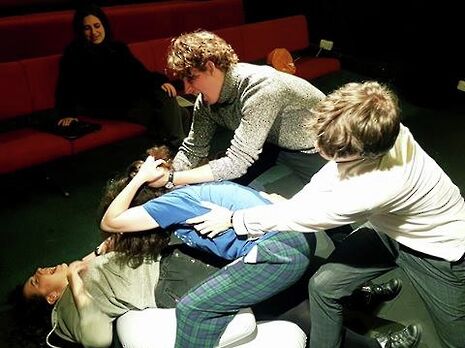Why banning posters for Bad Jews closes the conversation on anti-Semitism
Director Elinor Lipman responds to posters of her play being removed around town

Containing lines such as “Don’t holocaust me!” the content of the play Bad Jews is just as controversial its title. When we sent our posters – bagels on a pink background with the title and the writer’s name in brown – to print, I was expecting some degree of backlash. When putting the posters up, I was excited to have people come and ask difficult questions about the show, even to explain why they thought it was wrong. I wanted people to engage with it, rather than attempting to silence anything they disagreed with.
Instead, posters in town were pulled down overnight. I don’t know if this was by the local authorities, or by a lone ranger who decided they weren’t acceptable and took it upon themselves. I was also called to a meeting with my Head Porter (who was just doing his job) over those displayed outside of the college having “offended someone” who had made a complaint. Rather than opening discussion, getting rid of our posters achieved the exact opposite.
Two months ago, I was mindlessly playing a game that involved trying to be the first to grab a wooden tombola in the centre of a table. One of the guys in the group yelled at the successful grabber, “Jew!” No one said anything and an awkward silence followed before my boyfriend managed to awkwardly stumble out the words, “Hey… she’s Jewish.” Don’t get me wrong, this is anti-Semitism at its weakest – a microaggression at worst. But the posting of flyers denying the Holocaust at the Sidgwick Site and the writing of “Jet fuel can’t melt Jews. Holocaust was an inside job” on a public blackboard at Sussex University, are not.
As someone who finds this problematic, I wanted people to think critically about anti-Semitism. All too often, difficult topics are skirted around or silenced instead of people actually talking to each other about them. I’m curious if the person who complained about the offensiveness of the posters to my college or who ripped them down has read the play. Or, maybe having the title on the poster was enough to constitute an unacceptable level of offence? Would the offence have been redeemed if it were a different font or colour? Or is the combination of words “Bad Jews” prohibitively offensive in any public context? I won’t ever find out.
“When you try to build an ivory tower around what it means to be Jewish… you damage our ability to be understood by others”
The struggles for equal rights in Cambridge are so, so necessary, but unfortunately, a culture of shutting down debate or dissent, of being offended without explanation when someone’s view differs from your own and of shunning rather than showing someone why they are wrong, has grown to the point where it threatens to harm the very communities whose rights it seeks to uphold. By using the claim of anti-Semitism to shut down advertising for the show, the detractors of Bad Jews are unwittingly stifling a more thorough understanding of the challenges faced by diaspora Jews in the West.

Our cast and crew have actively attempted to understand the difficulties of this group as well as gain a deeper understanding of Judaism. We have eaten charoset together, discussed what being Jewish means and attended a Jewish Society Friday night dinner. The production we have created contains explicit language and depicts morally reprehensible characters in shocking yet hilarious exchanges. In putting this show together, Jews and non-Jews have collaborated not in answering, but in asking difficult questions through the medium of comedy. I think this is because the questions of assimilation and belonging which feature so heavily in the play have a relevance which extends far beyond the Jewish community.
I, a Jew, was collaboratively engaging with my own community in a way that wasn’t dialectical and someone felt adequately offended to decide for me and any other Jew or non-Jew who might be interested, that my interpretation of a shared identity was wrong. Their silencing of Bad Jews devalues the real and substantial meaning of anti-Semitism.
While discrimination against Jewish people continues, the charge of anti-Semitism cannot be levelled at anything that might offend a Jew’s feelings (i.e. criticizing how they express their Jewishness or their political views, opinions or affiliations). When this happens, the power of the word is severely diminished.
It is likely that the person who complained was Jewish. In this case, by attempting to censor me, your fellow Jew, you have inadvertently narrowed the scope and breadth of how we understand Jewish diasporic life. The questions surrounding belonging, membership and community which we all face, albeit to differing extents, and are addressed in this play, have been curtailed. When you try to build an ivory tower around what it means to be Jewish, outside of which no questions about our religion, race or culture may be openly asked, you damage our ability to be understood by others, and do so in a way that may run contrary to your intentions.
Bad Jews is a comedy. And a good one, my friend. Come and see it then make up your mind
 News / Caius mourns its tree-mendous loss23 December 2025
News / Caius mourns its tree-mendous loss23 December 2025 Comment / Yes, I’m brown – but I have more important things to say22 December 2025
Comment / Yes, I’m brown – but I have more important things to say22 December 2025 News / Cambridge welcomes UK rejoining the Erasmus scheme20 December 2025
News / Cambridge welcomes UK rejoining the Erasmus scheme20 December 2025 News / CUP announces funding scheme for under-represented academics19 December 2025
News / CUP announces funding scheme for under-represented academics19 December 2025 Interviews / Politics, your own way: Tilly Middlehurst on speaking out21 December 2025
Interviews / Politics, your own way: Tilly Middlehurst on speaking out21 December 2025









